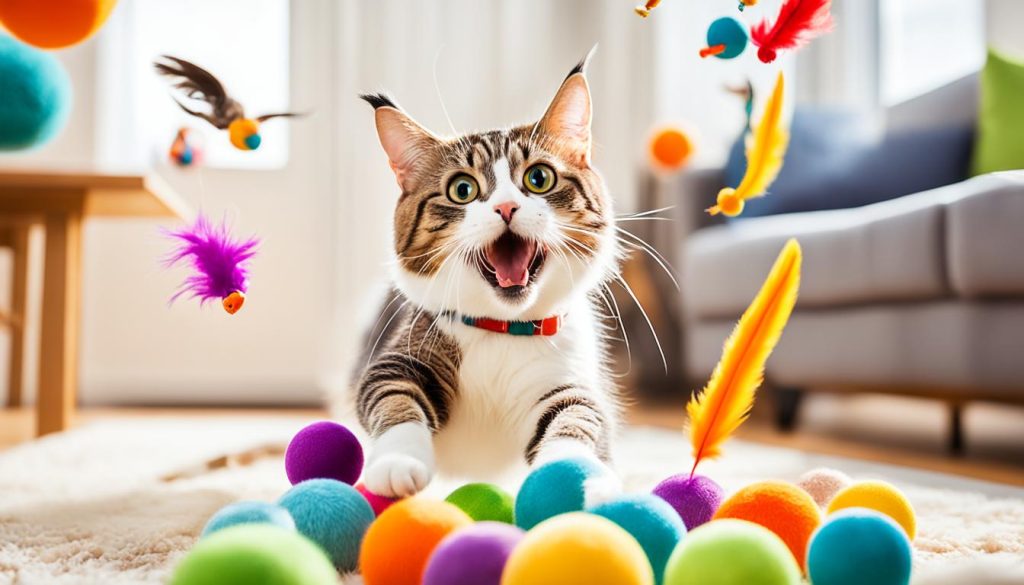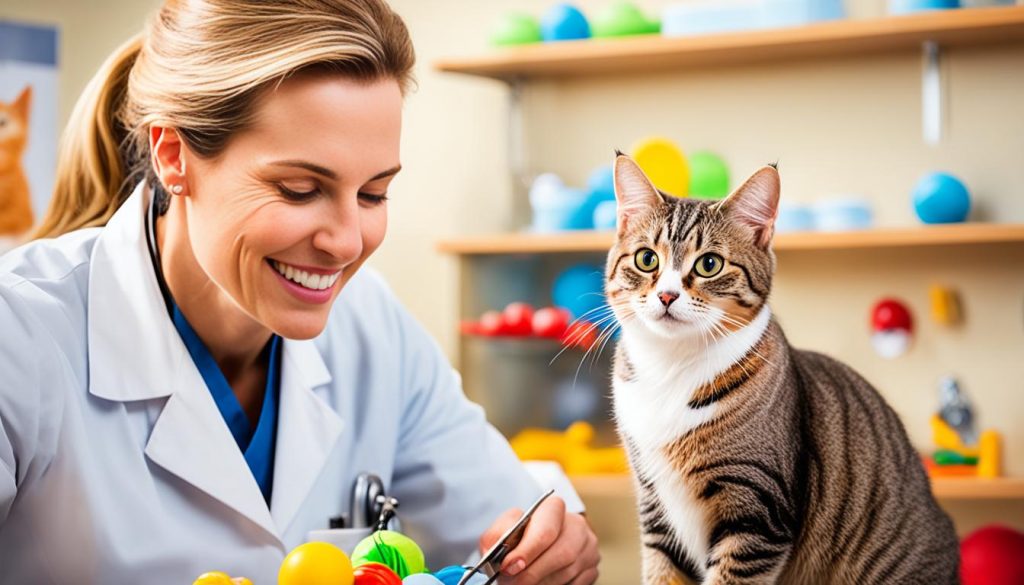Play is not just fun for your feline friend; it’s vital for their health and happiness. It is crucial for their physical, mental, and emotional well-being. Whether your cat loves staying indoors or exploring outside, play should be a key part of their day.
Through play, your cat gets the exercise they need. This helps them keep a healthy weight and avoid obesity-related issues like diabetes. Playtime improves heart health, strengthens muscles, and boosts agility. It even aids digestive health, keeping your cat’s system running smoothly.
But it’s not all about physical health. Play is key for your cat’s mental health too. Cats can feel anxious, sad, or lonely just like people. Play helps manage these feelings, lowering stress and boredom. It also keeps their mind sharp, eases anxiety, and makes your bond with them stronger.
Key Takeaways:
- Regular play is essential for a cat’s physical, mental, and emotional well-being.
- Play helps maintain a healthy weight, prevents obesity-related issues, and improves digestive health.
- Engaging in play stimulates cardiovascular activity, enhances muscle tone, and promotes agility and coordination.
- Play reduces anxiety, depression, and loneliness, providing a healthy outlet for emotions.
- Regular playtime strengthens the bond between cats and their owners, fostering a sense of security and well-being.
The Energetic Nature of Cats
Cats are lively, especially when young. But as they get older, they prefer naps over play. Keeping them active is still key for their health. Exercise and fun are important for them, even in their senior years.
Playing is great for cats of all ages. It keeps them fit and happy. Through play, cats stay active and avoid getting old too fast. They love chasing and pouncing during playtime. It’s a great way to keep them in good shape.
For lively cats, play helps burn off extra energy. This keeps their muscles strong and their heart healthy. By playing every day, cats stay in top condition.
Even older cats need play for exercise. It keeps them healthy and sharp. Play fights off age-related issues, making their lives better.
Spending time playing with your cat is crucial. It strengthens your bond and makes them happy. So, play with them daily for their health and happiness.
Emotional Benefits of Play for Cats
Cats, like humans, can feel a wide range of emotions. These include fear, depression, and loneliness. Regular play sessions can greatly benefit their emotional health. It gives them a way to release these feelings in a healthy manner.
When cats play, they can let out anger and frustration. This helps get rid of built-up energy and emotions. As a result, they feel secure, loved, and mentally active.
Play lets cats tap into their natural hunting skills. They love to chase, pounce on, and grab toys during playtime. This boosts their confidence and self-esteem. They feel accomplished and satisfied playing with toys and friends.
For shy cats, play is very helpful. It lets them beat their fears and become more confident. They learn to trust more and feel safer. This makes it easier for them to explore and get used to new places.
Play also helps cats feel less lonely and anxious. Interactive play means more attention from their owners. This strengthens their bond and makes them emotionally healthier. Playing often can make them feel like they have a friend and are socially connected.
In short, play is key for both physical and emotional health in cats. It’s a way for them to handle emotions like fear and loneliness. Playtime helps cats release negative energy, use their hunting skills, grow more confident, and beat their fears. By playing daily, you help keep your cat happy and healthy.
Mental Stimulation Through Play
Play provides more than physical benefits for cats. It also offers mental stimulation. Cats get a mental workout during playtime, similar to solving a puzzle.
They focus on perfecting the timing of their jumps and pounces. This requires concentration and precision. Such mental exercises are crucial for their cognitive growth and mental health.
Playtime keeps cats’ minds sharp, active, and entertained. It lets them use their problem-solving skills. During play, whether chasing a feather wand or a laser pointer, cats exercise both their bodies and minds.
H3: Different Types of Play for Mental Stimulation
Various play types stimulate cats’ minds:
- Puzzle toys: These toys make cats solve problems to get treats or surprises. They stimulate their minds and instincts.
- Treat-dispensing toys: Cats work to get treats from these toys. This provides mental challenge and rewards them.
- Hide-and-seek: Hiding toys or treats makes cats use their senses and memory. This stimulates their mental abilities.
- Interactive play: Playing with owners involves chasing and catching toys. It offers mental stimulation through focused play and interaction.
Adding these play types to a cat’s routine keeps their minds engaged. This fights boredom and promotes mental well-being.
Physical Benefits of Play for Indoor Cats
Indoor cats need special care, and playing helps them a lot. It lets them do things they naturally do, keeping them happy and healthy. Playing often keeps them fit and stops them from getting too heavy.
During play, indoor cats can pretend they are hunting. They stalk, chase, and jump at toys. This keeps them active and in good shape.
Playing also helps cats move more, which is good for their stomachs. It lets them stretch, stay flexible, and keep fit.
Getting indoor cats to play makes them lead joyful and healthy lives. It’s not just good for their bodies. It also makes them sharp and interested in the world around them.

The Importance of Movement Encouragement
Indoor cats depend on their owners for chances to move and exercise. Since they can’t go outside, owners need to make their home fun and active. They can do this with toys that make the cat think, and things to climb like cat trees.
Offering different toys and ways to play keeps indoor cats happy, active, and smart. It’s not only good for their health. It also stops them from getting bored and acting out.
Consulting a Veterinarian for Cat Wellness
Seeing a vet is key to keeping your cat healthy. Vets provide important health advice based on your cat’s needs. They help with specific concerns and give personalized tips.
Vets are trained to check your cat’s health, find sickness, and recommend treatments. They focus on preventing illnesses with vaccines and controlling parasites. They can guide you on your cat’s nutrition, behavior, and care.
Regular vet visits help keep your cat well by preventing diseases. These visits can catch health problems early. This means your cat can get quick treatment. Working with a vet means getting expert advice for your cat’s health.
The Benefits of Consulting a Veterinarian
Seeing a vet offers many advantages for your cat’s health:
- Comprehensive guidance: Vets give advice on diet, behavior, and how to prevent diseases.
- Expert diagnosis and treatment: Vets can spot and treat many cat illnesses, giving your cat the care it needs.
- Preventive care: Regular check-ups can find and prevent health issues before they become serious.
- Personalized recommendations: Vets offer advice that suits your cat’s age, breed, and health, making sure it gets the right care.
- Emergency assistance: Vets are there for you in emergencies, offering help and advice when you need it most.
Visiting a vet is crucial for your cat’s well-being. Vets use their knowledge and skills to give your cat the best care. They offer diagnoses, treatments, and advice that suit your cat’s individual needs.
Veterinary Consultations and Cat Wellness
| Benefits | Description |
|---|---|
| Preventive Care | Regular consultations allow for early detection of health issues and implementation of preventive measures. |
| Expert Diagnosis and Treatment | Veterinarians are trained to diagnose and treat various feline illnesses, ensuring appropriate medical care. |
| Personalized Recommendations | Veterinarians tailor their pet care advice based on your cat’s age, breed, and health status, providing individualized recommendations. |
| Emergency Assistance | In emergencies or urgent situations, veterinarians offer immediate support and guidance. |

Recommended Playtime for Cats
Playtime is key for your cat’s happiness. Experts say cats need 30 to 60 minutes of play each day. This can be broken into short sessions of 10 to 15 minutes. It might sound like a lot, but it’s crucial for their health.
Cats love to play with their owners using toys. This keeps their minds sharp and amused. Playing lets them act on their hunting instincts. It helps avoid boredom and lets out their energy. Plus, it makes them happy and mentally fit.
Playing with your cat does more than keep them active. It also makes your bond with them stronger. It brings a feeling of safety and joy. This deepens your connection with your furry friend.
If you can’t play with your cat, leave toys that make them think. Things like puzzle toys, interactive feeders, or treat-dispensing toys are great. These keep your cat busy and sharp even when you’re not there.
In short, aim for 30 to 60 minutes of playtime with your cat daily. Break this into small sessions. Use interactive play and smart toys. And always make playtime a top thing on your list. This will give your cat the best care and lots of joy.
Benefits and Ways to Play with Your Cat
Playing with your cat is very good for them. It keeps them fit and strengthens your bond. It also relieves stress and keeps them from getting bored. Playing regularly is good for their body and mind.
Physical Fitness
Active play keeps your cat in shape. It helps them burn off calories and stay at a healthy weight. Running, jumping, and pouncing keep their heart healthy and muscles strong. This activity is key to their physical health.
Bonding and Stress Relief
Playtime brings you and your cat closer. They learn to trust and feel happy around you. Play also helps both of you feel less stressed. It uses up their energy in a good way, making them calmer and happier.
Boredom Reduction
Boredom can make cats act out or feel bad. Play keeps their minds busy and happy. Using toys like feather wands, laser pointers, and boxes can entertain them for hours. Cat trees and scratching posts also give them fun places to climb and explore.
Toy Rotation
Changing toys keeps playtime fun and interesting. Cats might get bored with the same old toys. So, bringing in new toys and switching them out can keep them excited about playtime. This way, you can see what toys they like best.
Variety of Play Equipment
Cats like different kinds of toys. Feather wands feel like chasing birds. Laser pointers move in fun, unexpected ways. Boxes are great for hiding and playing. Cat trees let them climb and scratch. Using a mix of toys keeps your cat happy and engaged.
In conclusion, playing with your cat is really good for them. It keeps them active, builds your bond, and makes them happy. Plus, it fights stress and boredom. With different toys and regular play, your cat will lead a joyful, healthy life.
Conclusion
Play is crucial for cat’s health and happiness. It gives them a way to be physically active and sharp mentally. It also provides emotional support. Playing together strengthens the bond between cats and their owners. It helps keep them fit, lowers stress, and stops bad behaviors.
Understanding the value of play helps owners care for their cats in a complete way. Through regular play, cats stay active, joyful, and interested in the world around them. It lets them act on their instincts, explore, and learn new things.
Different toys, like feather wands or laser pointers, make playtime exciting. Each play session is a chance to grow closer to your cat. Prioritize play, and your cat will be healthier, smarter, and emotionally stronger.